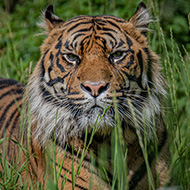Rare tiger arrives at Chester Zoo

“Dash is a handsome, confident young tiger and he’s quickly settled into his new surroundings" - Mike Jordan, Chester Zoo.
Conservationists at Chester Zoo are celebrating the arrival of a rare Sumatran tiger.
Three-year-old male Dash travelled from Ireland's Fota Wildlife Park as part of a breeding programme for the critically-endangered species.
Dash has been genetically matched with Chester Zoo's resident female, Kasarna, who was born in 2015. Experts hope the pair will hit it off and go on to play a vital role in saving their species from extinction.
Mike Jordan, director of animals and plants at Chester Zoo, said: “Dash is a handsome, confident young tiger and he’s quickly settled into his new surroundings. He’s been carefully matched with female tiger Kasarna, based on his age, character and his genetics, and we’re hopeful that they’ll soon strike up a close bond and, one day, go on to have cubs.”
Sumatran tigers are listed as critically endangered by the Internal Union for the Conservation of Nature (IUCN), with as few as 400 remaining in the wild. Their populations have taken a tumble owing to mass-scale habitat loss, poaching and human-tiger conflict.
Mike added: “Without conservation efforts like these, the future for the Sumatran tiger may soon look similar to that of Javan, Caspian and Balinese tigers, which heartbreakingly are all now extinct. We have it in our power not to let that happen and we’re going to do everything we can to ensure it doesn’t.”



 The latest
The latest